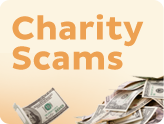The devastation caused by Typhoon Haiyan in the Philippines has left many people asking how they can help.
If you’re looking for a way to give, the Federal Trade Commission, the nation’s consumer protection agency, urges you to do some research to ensure that your donation will go to a reputable organization that will use the money as promised — and as you intend.
Urgent appeals for aid that you get in person, by phone or mail, by e-mail, on websites, or on social networking sites may not be on the up-and-up. Unfortunately, legitimate charities face competition from fraudsters who either solicit for bogus charities or aren't entirely honest about how a so-called charity will use your contribution. 
If you’re asked to make a charitable donation to support victims of Typhoon Haiyan in the Philippines, consider these tips:
- Donate to charities you know and trust. You want to find a charity with a proven track record with dealing with these disasters.
- Be alert for charities that seem to have sprung up overnight in connection with current events. Check out the charity with the Better Business Bureau's (BBB) Wise Giving Alliance, Charity Navigator, Charity Watch, or GuideStar.
- Designate the disaster. Charities may give the option to designate your giving to a specific disaster. That way, you can ensure your funds are going to disaster relief, rather than a general fund.
- Ask if a caller is a paid fundraiser, who they work for, and what percentage of your donation goes to the charity and to the fundraiser. If you don’t get a clear answer — or if you don’t like the answer you get — consider donating to a different organization.
- Beware of offers of prizes. If an organization offers the promise of a guaranteed win of a sweepstakes, it's very possible you could be dealing with a scam. Donating to a charitable cause is never a prerequisite to winning a sweepstakes prize.
- Don’t give out personal or financial information — including your credit card or bank account number — unless you know the charity is reputable.
- Never send cash: you can’t be sure the organization will receive your donation, and you won’t have a record for tax purposes.
- Find out if the charity or fundraiser must be registered in your state by contacting the National Association of State Charity Officials.
For more on the questions to ask and for a list of groups that can help you research a charity, go to Charity Scams.



